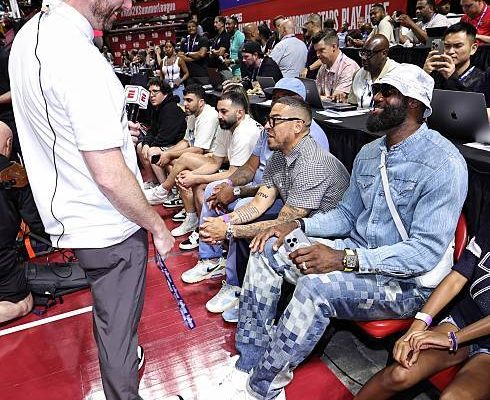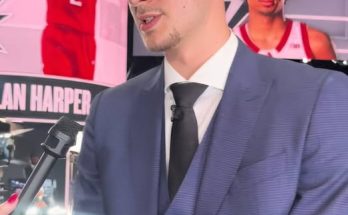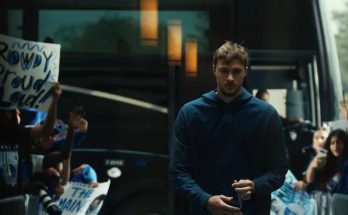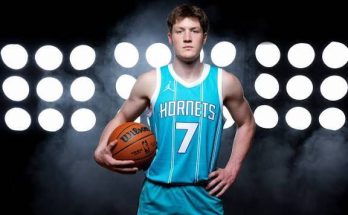The whirlwind of speculation that had overtaken the NBA rumor mill regarding LeBron James potentially joining the Dallas Mavericks has officially been put to rest. The Mavericks’ front office has categorically shut down the persistent trade rumors linking the NBA legend to the Lone Star State. For days, possibly weeks, fans and insiders alike were caught in a frenzy, envisioning what a pairing of LeBron James with Luka Dončić might look like on the hardwood. The hype reached a crescendo when cryptic social media posts and speculative talk shows hinted that the Mavericks were positioning themselves for a seismic move. But as of today, any such visions have been rendered fantasy, with Dallas firmly stating that no such discussions took place, nor were any planned for the future.
At the core of this development is the Mavericks’ desire to maintain continuity around their existing roster, which is being built strategically around Luka Dončić and the newly re-signed Kyrie Irving. LeBron James, while still an elite-level player with unmatched basketball IQ and global brand power, simply doesn’t fit into the Mavericks’ long-term financial and developmental blueprint. Team sources have emphasized that Dallas is focused on maintaining cap flexibility and investing in younger assets to prolong its championship window. Bringing in LeBron, with his sizable contract and need for high-usage offensive control, would disrupt that balance.
From the Lakers’ perspective, the notion of trading LeBron James was always absurd, even if the rumor mill enjoyed spinning it into a legitimate possibility. Despite their rollercoaster performance last season, Los Angeles remains fully committed to LeBron, who has expressed a desire to finish his career in purple and gold. The franchise is heavily invested in maximizing its current window with Anthony Davis and a supporting cast that includes promising young talent and strategic veteran acquisitions. Any potential move involving LeBron would not only require astronomical return assets, but would also risk alienating the most influential player in the league. That’s not a move Lakers owner Jeanie Buss or general manager Rob Pelinka are willing to consider.
Part of what fueled the speculative fire was the close personal and professional relationship between LeBron James and Kyrie Irving. Since their days in Cleveland, where they delivered a championship to the Cavaliers in 2016, there has been enduring curiosity about whether the duo would ever reunite. When Kyrie re-signed with Dallas last offseason, whispers began that he might try to lure LeBron to the Mavericks. The chatter only increased when LeBron publicly praised Luka Dončić, referring to him as “one of the smartest and most skilled players I’ve ever seen.” But admiration alone doesn’t equate to a roster overhaul, and Mavericks officials now want to set the record straight.
Team executives have stressed that at no point did they reach out to the Lakers regarding LeBron, nor did they receive any indication that he was being made available. While LeBron’s presence in summer league games and cryptic social media posts were interpreted by some as coded messages about his dissatisfaction or openness to a move, league insiders are now confirming that nothing of substance was ever in play. The Mavericks, in fact, view such speculation as a distraction from their ongoing efforts to build a deep, cohesive roster capable of competing with the likes of the Denver Nuggets and Boston Celtics for years to come.
There’s also the financial reality to consider. LeBron James is due to make upwards of \$51 million next season, a figure that would require significant salary-matching and likely the parting of multiple key rotation players on the Mavericks’ roster. In a league governed by a complex salary cap and newly enforced second apron rules, such a transaction would not only gut Dallas’ depth but also severely limit future flexibility. For a team that just re-upped Derrick Jones Jr., added Quentin Grimes, and is developing key young contributors like Jaden Hardy and Dereck Lively II, giving up such assets for a short-term splash makes little sense.
League sources close to both franchises believe the entire rumor cycle was largely media-driven, with no grounding in actual front office communication. It’s not uncommon in the NBA for major stars to be used as clickbait during quiet offseasons, but the LeBron-to-Dallas saga reached a fever pitch that surprised even seasoned league insiders. The Mavericks shutting it down this forcefully appears to be a conscious effort to regain narrative control and refocus attention on what the team is actually doing behind the scenes.
Internally, Mavericks leadership remains confident in its roster composition. Luka Dončić continues to ascend into full-fledged superstardom, and the chemistry he has developed with Kyrie Irving shows promise, especially when both are healthy. The front office believes that its best path to contention is continuity, patience, and defensive improvement—not headline-grabbing trades that mortgage the future for short-term glamour. The re-signing of key role players, the acquisition of versatile defenders, and the development of younger players all signal a plan rooted in sustainability rather than reactive star-chasing.
On LeBron’s end, sources close to his camp say he’s more focused on legacy-building in Los Angeles than on jumping ship to chase one last ring elsewhere. Entering his 22nd NBA season, James remains an elite force, but his priorities have evolved. He’s heavily involved in off-court ventures, from production to philanthropy, many of which are based in or around Southern California. More importantly, his son, Bronny James, was just drafted by the Lakers, and the opportunity to share the court with his son is a once-in-a-lifetime moment LeBron isn’t likely to jeopardize with a sudden relocation. Playing with Bronny in the Lakers’ iconic gold and purple is a career milestone he has often alluded to, and it’s expected to be a key part of his farewell arc.
To some fans, especially those in Dallas hoping for an instant superteam, the confirmation that LeBron James will not be joining the Mavericks may come as a disappointment. However, to team decision-makers, the clarity provides an opportunity to refocus on the real work at hand—building a championship-caliber team from within, rather than relying on external blockbuster moves. The Mavericks’ stance sends a strong message to their players and fanbase: the team is committed to its current direction and believes it has what it takes to contend without needing to import aging superstars.
Ultimately, this episode serves as a reminder of how easily modern sports discourse can be swept away by speculation, star power, and algorithm-fueled headlines. While it’s always tempting to dream up dramatic shifts in the league’s power structure, the NBA remains a business rooted in strategy, development, and financial pragmatism. The Mavericks’ rejection of the LeBron trade narrative reflects a broader evolution in team-building philosophy around the league: sustained success is less about flash and more about fit, culture, and long-term cohesion.
For now, fans can put the fantasy of LeBron James donning a Mavericks jersey to rest. It’s not happening. And if the Mavericks have anything to say about it, they’d rather make their mark with the talent they’ve assembled, not by chasing ghosts of past greatness. As the dust settles, both Dallas and Los Angeles can move forward with clarity—and a renewed focus on their respective championship pursuits, rooted in the here and now.



